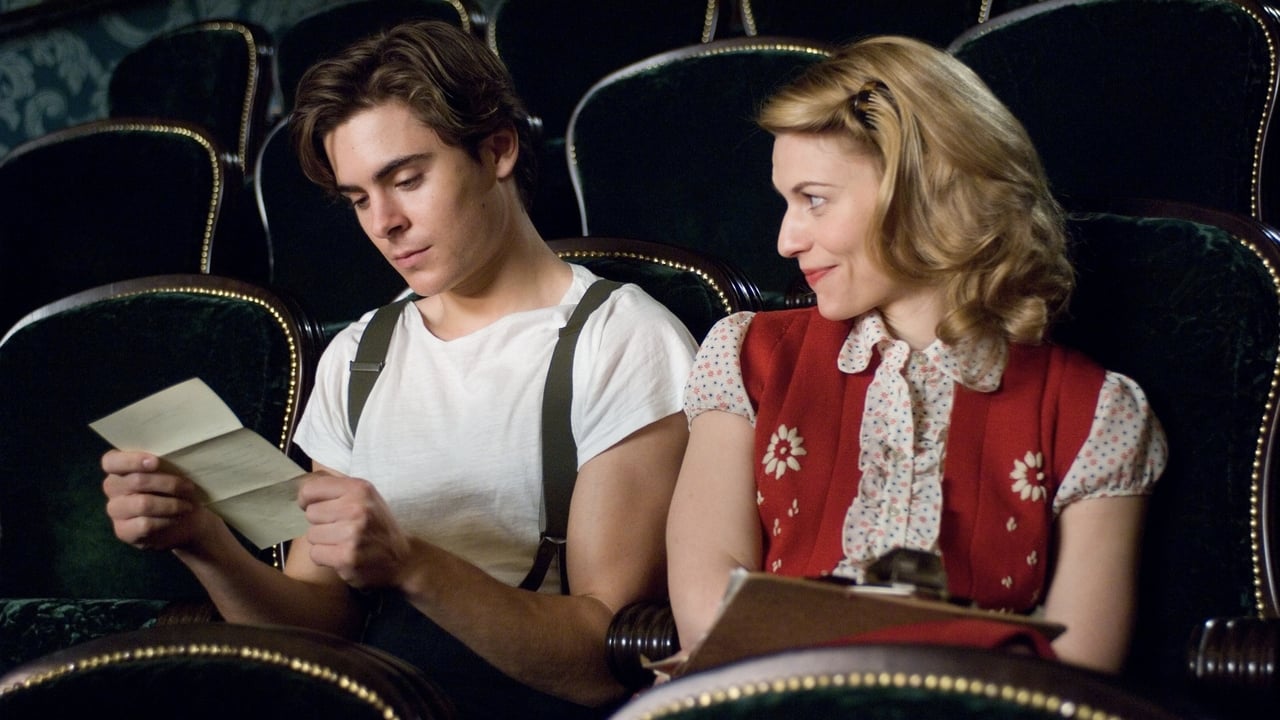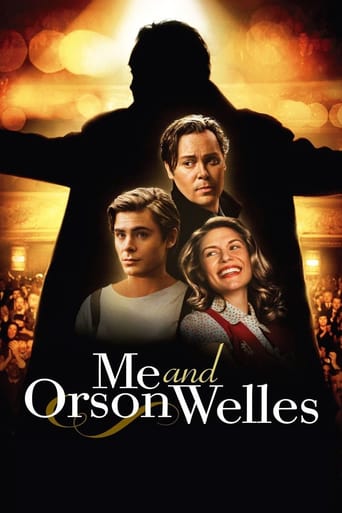2hotFeature
one of my absolute favorites!
StyleSk8r
At first rather annoying in its heavy emphasis on reenactments, this movie ultimately proves fascinating, simply because the complicated, highly dramatic tale it tells still almost defies belief.
Bergorks
If you like to be scared, if you like to laugh, and if you like to learn a thing or two at the movies, this absolutely cannot be missed.
Dana
An old-fashioned movie made with new-fashioned finesse.
Dunham16
This movie follows the experience of a pushy high school student who unexpectedly finds himself in the position of an oppressed capable in a Broadway Shakespeare production in New York City, goes through precisely what many young Americans seeking success in employment of first choice as a goal to advance in life experience and ends up the wiser for it without gaining anything substantial. One strong point is the elegance of how 1930's New York City is portrayed. Another is even though this as much a parable of the underbelly of New York's Broadway as is Damon Runyon's GUYS AHD DOLLS, the message is so universal many folks who remember seeking advancement through the work world and end up wiser and better in mature life for the adventure without serious salary payment or serious job security to show for what they wanted to make a favored career. A fast moving film easy to look at and easy to listen to that will probably appeal on different levels to most filmgoers.
miloc
Richard Linklater's film of Robert Kaplow's novel merits a watch, if only for Christian McKay's splendid evocation of the young Orson Welles. McKay has the vocal chops, the look (in profile it's uncanny) and, most importantly, the attitude. Without apparent effort, he catches the mammoth self-confidence that made Welles one of the most intimidating screen presences in cinema. I have no idea how much time and effort this actor (in his first feature film) spent in mastering the smirk Welles gives when neophyte actor Richard Samuels (Zac Efron) talks of his "lover"; in any case the work pays off. It's like a cameo by Harry Lime.This movie uses the Mercury Theatre's celebrated production of Julius Caesar as backdrop to its rather slight story. The screenplay tells us that Welles, whatever genius he possessed, may not have been a great guy-- and, well... are we wrong to ask how much that matters? Efron, as the young hopeful who falls into Welles's considerable gravitational pull, has a certain charm and potential talent, but looks and acts somehow utterly of his own time-- we never believe him as a 1930s construct. (Possibly he hasn't watched enough old movies.) He falls in love with Claire Danes, who plays an ambitious... something, I missed exactly what her job was. Script girl? Dramaturge? Anyway, she works on the play. Danes does a decent job as whatever she is, but she and Efron generate zero chemistry. "Why am I so interested in you?" she asks at one point. I had no guesses.If I had to speculate, I'd say that the romantic plot did not grab the director much. He does good work casting the real-life characters. Eddie Marsan makes a credible John Houseman; Ben Chaplin registers strongly as a nerve-racked George Coulouris; and James Tupper looks, sounds, and feels right as the affable young ladies' man Joe Cotten. The backstage squabbles, trivial though they may be, draw more interest than the emotional business upfront. And Linklater truly comes awake as a director in capturing performance: whether he's staging a quick radio sequence in which Welles steals the show or very finely recreating the Mercury's legendary Caesar, you get the feeling Linklater would be happiest just sitting back and watching the show. And here the movie is at its best-- far more than Tim Robbins' earnest, turgid Cradle Will Rock, this movie, absent of politics, captures the excitement of truly revolutionary theater at a time when such a thing was still possible.In fact, that lack of earnestness may be the key here. Caesar was a great production not because it deconstructed Hitler, but because Welles gave it a sense of importance strong enough to deconstruct anything. Welles was a great artist, and perhaps more crucially he was a great bulls--t artist. Let's put it more simply: that WAS his art. This is a film about learning to bulls--t, learning when not to say what you mean, learning when not to be honest-- and that's bracing. It reminds us that trickery, deception and narcissism can be magic, and that egotism with a will to dazzle us can be more dazzling than anything we describe as "talent" and "sincerity". It's why the movie stalls when McKay is not on screen-- he convinces us he IS Orson Welles, that he is the most important man in the world-- and in defiance of logic and perspective, we buy it. And at the end of the day, that transparent and fantastic lie-- that's art.
trewrtew
This film was shot on some kind of HD video. That's not the problem. What made me hit the eject button on my blu-ray player was the nauseating, sepia (tobacco-like) tint they ran it through - probably in an attempt to make it look like film. What's more, the blu-ray/DVD versions were not released in the original 2.3:1 widescreen but in 16:9 video aspect ratio. When HD video finally wins our hearts it will be with its own, brilliant colours - not by trickery. Until then, I "believe in video, but I dream in film"*. They only saved a little by not using film; was it worth the sacrifice? I used to wish DVD-cases were labelled "shot on video" whenever necessary. Lately, however, several genre-specific films have been released where I found HD to be the ideal medium (The Social Network, Avatar). But the dramatic genre of this film means it is cheapened by the digital acquisition format used.*We used to say, "We see in colour but we dream in black & white."
gemmampass
Set in the post depression of New York, budding actor Richard Linclaters (Zac Efron) gets a part in a theatre show run by Orson Welles. Soon Richard discovers the demands needed to stay in a theatre run by a truly power hungry man whilst understanding there are some people out there that will do anything to succeed.This explores the ups and downs of theatre lift and how a slight romance can interrupt that.It includes an interesting insight into the early life of Orson Wells, although not showing him in the nicest of lights. Basically whatever Orson wants Orson gets.The story line is a bit weak and the film itself is slow with little much happening. It takes a while to get into but it's an easy film to follow.Zac Efron gives his usual convincing performance although it is good to see him taking new directions other than his usual films.

